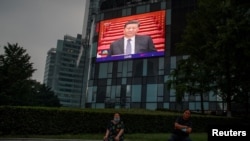China’s parliament will propose legislation to protect security in Hong Kong in response to pro-democracy protests in the territory last year that often turned violent.
National People’s Congress spokesman Zhang Yesui announced the plan Thursday as an annual high-level political conference in China that was delayed by the coronavirus pandemic for two months got underway Thursday in Beijing.
Zhang said the ceremonial parliament will consider a measure aimed at “establishing and improving the legal system and enforcement mechanisms for the Hong Kong Special Administrative Region to safeguard national security.”
Zhang’s announcement seemed to confirm speculation that Beijing would bypass Hong Kong’s own legislature in approving legislation to prevent activity in the territory.
Security laws for Hong Kong have long been considered but Beijing accelerated efforts to enact them after months of anti-government protests in the former British colony that was handed over to China in 1997.
The legislation could lead to a change in its special status in the U.S. and likely to trigger more unrest.
Calls for protests began appearing online Thursday night and dozens of people were seen yelling pro-democracy slogans in a Hong Kong shopping mall as riot police stood nearby.
U.S. Secretary of State Mike Pompeo said earlier this month he was delaying a report evaluating whether Hong Kong was autonomous enough to justify Washington's special economic treatment that has helped it remain a global financial center. Pompeo said Wednesday he was “closely watching what’s going on” in the territory.
People in Hong Kong regularly took to the streets last year to protest legislation that has since been withdrawn that would have allowed criminal suspects to be extradited to mainland China. The protests evolved into a movement that also called for more democratic freedoms.
Zhang’s announcement was made at the Chinese People's Political Consultative Conference, which began Thursday as the government touts what it says is a victory over the outbreak that started in the central Chinese city of Wuhan in late 2019.
CPPCC chairman Wang Yang delivered the Standing Committee’s report to the National Committee.
Wang’s report said the more than 2,000 members at the conference can "tell the world about how China, as a responsible major country, has taken firm action and contributed to international cooperation in the fight against the COVID-19 epidemic.”
Members wearing masks gathered in the auditorium inside the Great Hall of the People in Beijing. Wang, President Xi Jinping and other top officials did not.
The CPPCC session will be followed Friday by the commencement of the National People's Congress, the ceremonial parliament. Premier Li Keqiang is scheduled to deliver a keynote address outlining economic and social objectives for the year.
It is not publicly known whether Li will give the usual report on economic growth projections for the world’s second-largest economy, which has been devastated by the pandemic.
This year’s meetings of the CPPCC and the National People’s Congress will be shortened from two weeks to one week because of the pandemic.
Supported by a state propaganda campaign, Xi has been praised at home for containing the virus, while his handling of the initial outbreak has been questioned by the U.S. and some other countries.









